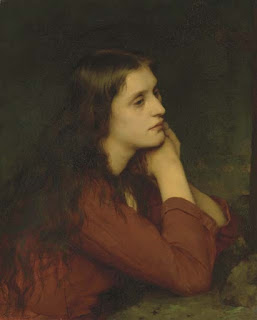_-_WGA10422.jpg) |
El Greco - A Boy Blowing on an Ember to Light a Candle
(Muchacho encendiendo una candela) |
Presently at our touch the teacup stirred,
Then circled lazily about
From A to Z. The first voice heard
(If they are voices, these mute spellers-out)
Was that of an engineer
Originally from Cologne.
Dead in his 22nd year
Of cholera in Cairo, he had KNOWN
NO HAPPINESS. He once met Goethe, though.
Goethe had told him: PERSEVERE.
Our blind hound whined. With that, a horde
Of voices gathered above the Ouija board,
Some childish and, you might say, blurred
By sleep; one little boy
Named Will, reluctant possibly in a ruff
Like a large-lidded page out of El Greco, pulled
Back the arras for that next voice,
Cold and portentous: ALL IS LOST.
FLEE THIS HOUSE. OTTO VON THURN UND TAXIS.
OBEY. YOU HAVE NO CHOICE.
Frightened, we stopped; but tossed
Till sunrise striped the rumpled sheets with gold.
Each night since then, the moon waxes,
Small insects flit round a cold torch
We light, that sends them pattering to the porch . . .
But no real Sign. New voices come,
Dictate addresses, begging us to write;
Some warn of lives misspent, and all of doom
In ways that so exhilarate
We are sleeping sound of late.
Last night the teacup shattered in a rage.
Indeed, we have grown nonchalant
Towards the other world. In the gloom here,
our elbows on the cleared
Table, we talk and smoke, pleased to be stirred
Rather by buzzings in the jasmine, by the drone
Of our own voices and poor blind Rover’s wheeze,
Than by those clamoring overhead,
Obsessed or piteous, for a commitment
We still have wit to postpone
Because, once looked at lit
By the cold reflections of the dead
Risen extinct but irresistible,
Our lives have never seemed more full, more real,
Nor the full moon more quick to chill. |
|
|
|
* Taken from a newsletter by Poetryfoundation
This is my first time reading this author, what I´ve found most interesting about his work, from the little I know of it, is the way he uses his personal experiences to build his poems. In Voices from the other world, James Merrill tells us about the time when he was given a Ouija and his own experiences using it with his friend.
In the poem we can notice the life cycle of the common experiences. At the beggining, the writer is excited about his new project. Then, he and his friend feel fear upon hearing the voices of the dead and have to stop "Frightened, we stopped." he says. But later, they grow accustomed to the same situations repeating over and over "we have grown nonchalant" so they no longer feel fear.
I find it interesting how we become used to certain activities through repetition, even when they once seemed extraordinary or frightening. Merrill’s poem suggests that even the supernatural, when experienced repeatedly, can become part of the ordinary.
Inspired by the poem, I would like to elaborate a brief verse
Last night, I went back to work,
Pulled the Ouija from the old trunk.
I traced his name letter by letter,
But he seemed far too busy now,
More than when we played, seeking voices.
I asked the IA ChatGPT to write his own also
The planchette moved, but not for me
A hand once steady now fades in dust,
Whispering names I no longer trust.
IA's verse was kind of disturbing, but I think I like it!
--------------------------------------------------------------------------------------------------------------------
Hay poemas dificiles de traducir, de hecho, pienso que la mayoria de los poemas pierden su esencia cuando uno los traduce, ya sea por la estructura formal o por el aspecto semántico, pero hay mucho que se pierde de la intención del autor. Esto nunca me ha detenido y casi siempre insisto en buscar maneras de trasladar de un idioma a otro lo más posible. En este caso, voy a hacer el intento solo con algunos de los versos que me gustaron más del poema.
"Asustados, nos detuvimos
y dimos vueltas en la cama
hasta que el amanecer tiñó las sábanas arrugadas de oro.
Cada noche desde entonces, la luna crece,
pequeños insectos revolotean una antorcha fría
que encendemos enviándolos aleteando hacia el porche"
Es evidente que se pierde la estructura del poema, pero se conserva la esencia de la cotidianidad, nos sigue mostrando que el sentir del poeta durante su experiencia usando la ouija con su amigo, sus temores y sus pequeños rituales cotidianos.
De este poema rescato la manera en la que el autor muestra como vamos adaptándonos a las rutinas, vamos perdiendo interés y generando costumbres. Un tema sería entonces el agotamiento de lo rutinario. Pero esa es solo una lectura, porque también lo podríamos abordar desde lo nostálgico, sobre el final del poema, el autor señala que sus vidas nunca fueron tan plenas como en esos tiempos, parece que añora esa etapa de su vida jugando a la ouija con su amigo, de esa lectura salió mi ejercicio de más arriba intentando elaborar un verso en inglés inspirado en el poema de Merrill.
© JorgeRGalán 2025
_-_WGA10422.jpg)


Comentarios
Publicar un comentario